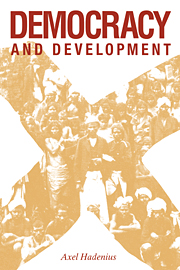
-
Select format
-
- Publisher:
- Cambridge University Press
- Publication date:
- 28 October 2009
- 17 September 1992
- ISBN:
- 9780511549731
- 9780521416856
- 9780521055307
- Dimensions:
- (228 x 152 mm)
- Weight & Pages:
- 0.482kg, 232 Pages
- Dimensions:
- (228 x 152 mm)
- Weight & Pages:
- 0.359kg, 232 Pages
You may already have access via personal or institutional login
Book description
This book is a thorough investigation into the requisites of democracy. Based on data from 132 sovereign states of the Third World, it first establishes a scale to measure the level of democracy existing in these countries. The author discusses various interpretations of the meaning of political democracy, and emerges with a specification of its essential elements which includes such elements as the holding of elections to central decision-making organs, and the maintenance of certain fundamental political liberties. Theories concerning the requisites of democracy are then examined in order to explain the manifest differences in the level of democracy among the states of the Third World. The author employs statistical techniques including regression analysis to test theories related to socio-economic conditions, demographic and cultural factors, and institutional arrangements. This book thus provides a wide-ranging examination both of the elements which constitute democracy, and of the factors which explain its varying prevalence.
Reviews
‘The book is based on thorough documentation and is very informative.’
Source: Administrative Sciences
Contents
Metrics
Altmetric attention score
Full text views
Full text views help Loading metrics...
Loading metrics...
* Views captured on Cambridge Core between #date#. This data will be updated every 24 hours.
Usage data cannot currently be displayed.
Accessibility standard: Unknown
Why this information is here
This section outlines the accessibility features of this content - including support for screen readers, full keyboard navigation and high-contrast display options. This may not be relevant for you.
Accessibility Information
Accessibility compliance for the PDF of this book is currently unknown and may be updated in the future.


